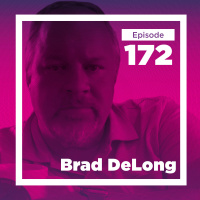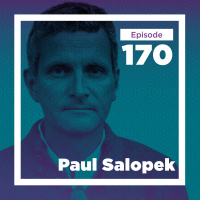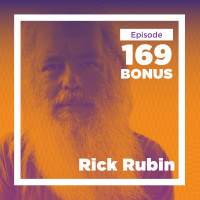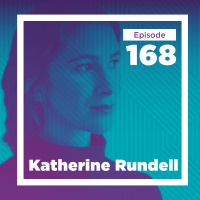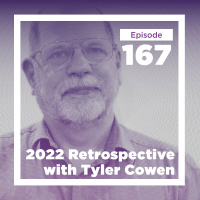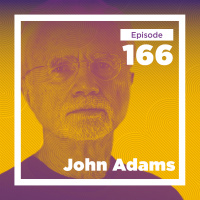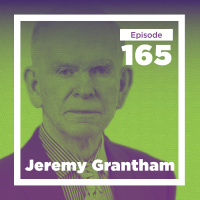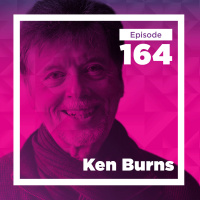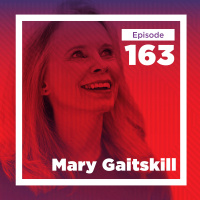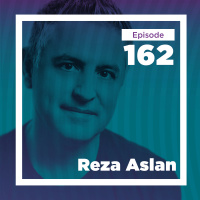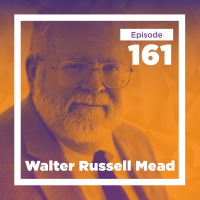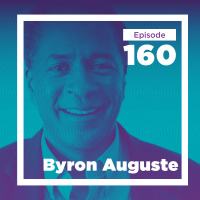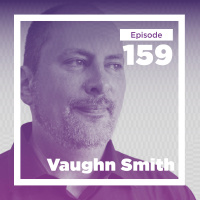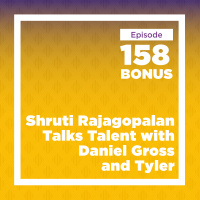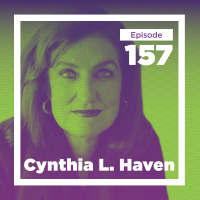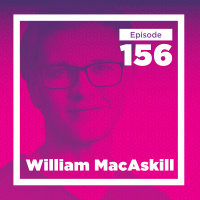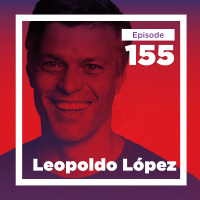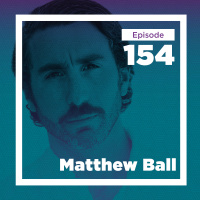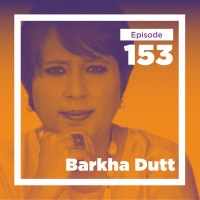Sinopsis
Tyler Cowen engages todays deepest thinkers in wide-ranging explorations of their work, the world, and everything in between. New conversations every other Wednesday. Subscribe wherever you get your podcasts.
Episodios
-
Brad DeLong on Intellectual and Technical Progress
22/02/2023 Duración: 47minBrad DeLong, professor of economics at UC Berkley, OG econ blogger, and Tyler’s Harvard classmate, joins the show to discuss Slouching Towards Utopia, an economic history of the 20th century that’s been nearly thirty years in the making. Tyler and Brad discuss what can really be gleaned from the fragmentary economics statistics of the late 19th century, the remarkable changes that occurred from 1870-1920, the astonishing flourishing of German universities in the 19th century, why investment banking allowed America and Germany to pull ahead of Britain economically, what enabled the Royal Society to become a force for progress, what Keynes got wrong, what Hayek got right, whether the middle-income trap persists, his favorite movie and novel, blogging vs. Substack, the Slouching Towards Utopia director’s cut, and much more. Read a full transcript enhanced with helpful links, or watch the full video. Recorded November 11th, 2022 Other ways to connect Follow us on Twitter and Instagram Follow Tyler on Twitter F
-
Glenn Loury on the Cover Story and the Real Story
08/02/2023 Duración: 48minEconomist and public intellectual Glenn Loury joined Tyler to discuss the soundtrack of Glenn’s life, Glenn's early career in theoretical economics, his favorite Thomas Schelling story, the best place to raise a family in the US, the seeming worsening mental health issues among undergraduates, what he learned about himself while writing his memoir, what his right-wing fans most misunderstand about race, the key difference he has with John McWhorter, his evolving relationship with Christianity, the lasting influence of his late wife, his favorite novels and movies, how well he thinks he will face death, and more. Read a full transcript enhanced with helpful links. Recorded January 11th, 2023 Other ways to connect Follow us on Twitter and Instagram Follow Tyler on Twitter Follow Glenn on Twitter Email us: cowenconvos@mercatus.gmu.edu Subscribe at our newsletter page to have the latest Conversations with Tyler news sent straight to your inbox.
-
Paul Salopek on Walking the World
25/01/2023 Duración: 45minPaul Salopek is a Pulitzer Prize-winning journalist and National Geographic fellow who, at the age of 50, set out on foot to retrace the steps of the first human migrations out of Africa. The project, dubbed the “Out of Eden Walk,” began in Ethiopia in 2012 and will eventually take him to Tierra Del Fuego, a distance of some 24,000 miles. Calling in just as he was about to arrive in Xi’an, he and Tyler discussed his very localized supply chain, why women make for better walking partners, the key to crossing deserts, the most difficult terrain to traverse, what he does for exercise, his information prep for each new region, how he’s kept the project funded, which cuisines he’s found most and least palatable, what he learned working the crime beat in Roswell, New Mexico, how this project challenges conventional journalism, his thoughts on the changing understanding of early human migration, and more. Read a full transcript enhanced with helpful links. Recorded October 13th, 2022 Other ways to connect Follow us
-
Rick Rubin on Listening, Taste, and the Act of Noticing
18/01/2023 Duración: 55minRick Rubin has been behind some of the most iconic and successful albums in music history, and his unique approach to production and artist development has made him one of the most respected figures in the industry. He joined Tyler to discuss how to listen (to music and people), which artistic movement has influenced him most, what Sherlock Holmes taught him about creativity, how streaming is affecting music, whether AI will write good songs, what he likes about satellite radio, why pro wrestling is the most accurate representation of life, why growing up in Long Island was a “miracle,” his ‘do no harm’ approach to working with artist, what makes for a great live album, why Jimi Hendrix owed his success to embracing technology, what made Brian Eno and Brian Wilson great producers, what albums he's currently producing, and more. Read a full transcript enhanced with helpful links. Recorded January 13th, 2023 Other ways to connect Follow us on Twitter and Instagram Follow Tyler on Twitter Follow Rick on Twitte
-
Katherine Rundell on the Art of Words
11/01/2023 Duración: 53minKatherine Rundell is, in a word, enthusiastic. She’s enthusiastic about John Donne. She’s enthusiastic about walking along rooftops. She’s enthusiastic about words, and stories, and food. She has often started her morning with a cartwheel and is currently learning to fly a small plane. A prolific writer, her many children’s books aim to instill the sense of discovery she still remembers from her own unruly childhood adventures—and remind adults of the astonishment that still awaits them. She joined Tyler to discuss how she became obsessed with John Donne, the power of memorizing poetry, the political implications of suicide in the 17th century, the new evidence of Donne’s faith, the contagious intensity of thought in 17th century British life, the effect of the plague on national consciousness, the brutality of boys’ schooling, the thrills and dangers of rooftop walking, why children should be more mischievous, why she’d like to lower the voting age to 16, her favorite UK bookshop, the wonderful weirdness of
-
Conversations with Tyler 2022 Retrospective
28/12/2022 Duración: 52minOn this special year-in-review episode, Tyler and producer Jeff Holmes talk about the past year on the show, including which guests he’d like to have on in 2023, what stands out to him now about his conversation with Sam Bankman-Fried in light of the collapse of FTX, the most popular and most underrated episodes of the year, what makes a guest authentic, why he hasn’t asked the “production function” question much this year, his essay on Marginal Revolution on the New Right, and what he’s working on next. They also evaluate Tyler’s pop culture picks from 2012 and answer listener questions from Twitter. Read a full transcript enhanced with helpful links, or watch the full video. Support Conversations with Tyler by making a donation during this holiday season! Recorded December 14th, 2022 Other ways to connect Follow us on Twitter and Instagram Follow Tyler on Twitter Follow Jeff on Twitter Email us: cowenconvos@mercatus.gmu.edu Subscribe at our newsletter page to have the latest Conversations with Tyler news
-
John Adams on Composing and Creative Freedom
14/12/2022 Duración: 45minIs classical music dying? For John Adams the answer is an emphatic no. Considered by Tyler to be America’s greatest living composer, he may well be one of the people responsible for keeping it alive. John’s contemporary classical music is some of the most regularly performed and he is well-known for his historically themed operas such as Nixon in China, Doctor Atomic, and most recently Antony and Cleopatra. He is also a conductor and author of, in Tyler’s words, a “thoughtful and substantive” autobiography. He joined Tyler to discuss why architects have it easier than opera composers, what drew him to the story of Antony and Cleopatra, why he prefers great popular music to the classical tradition, the “memory spaces” he uses to compose, the role of Christianity in his work, the anxiety of influence, the unusual life of Charles Ives, the relationship between the availability and appreciation of music, how contemporary music got a bad rap, his favorite Bob Dylan album, why he doesn’t think San Francisco was cr
-
Jeremy Grantham on Investing in Green Tech
30/11/2022 Duración: 40minWhen it comes to fighting climate change Jeremy Grantham is optimistic about technology – but worried about timing. Known widely for his acuity in identifying bubbles, the British investor contends that the one created by our dependence on fossil fuels is about to pop. He’s on a mission to make green energy cheaper, faster and is well on his way. After a lifetime spent thinking about resources, he’s using his to power the development of green technology. The Grantham Foundation has invested into 45 early-stage green projects, such as improving the efficiency of lithium extraction. He joined Tyler to discuss the most binding constraint on the green transition, why we need an alternative to lithium, the important message sent by Biden’s Inflation Reduction Act, the marginal cost basis of green energy, the topsoil crisis in the Midwest, why estimates of the cost of global warming vastly underestimate its effects, why he distrusts economists, the overpricing concentrated in the US stock market, the consequences o
-
Ken Burns on the Complications of History
16/11/2022 Duración: 52minWhen it comes to history—particularly American history—nothing is ever definitive, says documentarian Ken Burns. Much of his work has focused on capturing that history in film, but in his new book, Our America: A Photographic History, his goal is to share the complexity of his country as well as honor those roots in still images. From the very first photograph, a self-portrait, to our modern inundation with selfies, he tells “the story of us” – a story of darkness and light, just as in the photographic process itself. Ken joined Tyler to discuss how facial expressions in photos have changed over time, where in the American past he’d like to visit most, the courage of staying in place, how he feels about intellectual property law, the ethical considerations of displaying violent imagery, why women were so prominent in the early history of American photography, the mysteries in his quilt collection, the most underrated American painter, why crossword puzzles are akin to a cup of coffee, why baseball won’t die o
-
Mary Gaitskill on Subjects That Are Vexing Everybody
02/11/2022 Duración: 45minMary Gaitskill’s knack for writing about the social and physical world with unapologetic clarity has led to her style being described both as "cold and brutal” and “tender and compassionate.” Tyler considers her works The Mare, Veronica, and Lost Cat to be some of the best and most insightful American fiction in recent times. And lately she’s taken to writing essays on Substack, where she frankly analyzes “subjects that are vexing everybody,” including incels, Depp v. Heard, and political fiction. She joined Tyler to discuss the reasons some people seem to choose to be unhappy, why she writes about oddballs, the fragility of personality, how she’s developed her natural knack for describing the physical world, why we’re better off just accepting that people are horrible, her advice for troubled teenagers, why she wouldn’t clone a lost cat, the benefits and drawbacks of writing online, what she’s learned from writing a Substack, what gets lost in Kubrick’s adaptation of Lolita, the not-so-subtle eroticism of
-
Reza Aslan on Martyrdom, Islam, and Revolution
19/10/2022 Duración: 53minReza Aslan doesn’t mind being called a pantheist. In his own “roundabout spiritual journey” and study of the world’s religions, which has led him to write books on Islam, the life of Jesus Christ, God, and most recently an American martyr in Persia, he has come to believe the Sufi notion that religion is just a shell one must break through to truly understand God—and that if God is anything at all, then all is God. He joined Tyler to discuss Shi’a and Christian notions of martyrdom, the heroism of Howard Baskerville, the differences between Sunni and Shi’a Islam, esoteric vs. exoteric expressions of religion, how mystical movements arise more organically than religion, the conflicts over Imams in the Islamic world, how his upbringing as an Iranian immigrant shaped his view of religion, his roundabout spiritual journey, the synthesis of Spinoza and Sufism, the origins of Wahhabism, the relationship (or lackthereof) between religion and political philosophy, the sad repetition of history in Iran, his favori
-
Walter Russell Mead on the Past and Future of American Foreign Policy
05/10/2022 Duración: 51minA leading expert in foreign policy, Walter Russell Mead believes his lack of a PhD—and interest in actually going places—has helped him avoid academic silos and institutional groupthink that’s rendered the field ineffective for decades. Mead’s latest book, which explores the American-Israeli relationship, is characteristically wide-ranging and multidisciplinary, resulting in “less a history of U.S.-Israel policy than a sweeping and masterfully told history of U.S. foreign policy in general”, according to a New York Times review. He joined Tyler to discuss how the decline of American religiosity has influenced US foreign policy, which American presidents best and least understood the Middle East, the shrewd reasons Stalin supported Israel, the Saudi secret to political stability, the fate of Pakistan, the most likely scenario for China moving on Taiwan, the gun pointed at the head of German business, the US’s “murderous fetishization of ideology over reality” in Sub-Saharan Africa, the inherent weakness in h
-
Byron Auguste On Rewiring the U.S. Labor Market
21/09/2022 Duración: 54minWhen looking at the U.S. labor market, Byron Auguste sees too many job seekers screened out based on shallow signals like a bachelor’s degree, and too few ‘screened in’ by directly demonstrating the skills needed for the job at hand. To close those opportunity gaps in the American workforce, Byron co-founded and runs Opportunity@Work, which played a key role in Maryland’s decision in early 2022 to drop four-year degree requirements for thousands of state jobs in favor of recruiting from those identified as being Skilled Through Alternate Routes, or STARs. He joined Tyler to discuss workforce training in the digital economy, re-evaluating college degree requirements in recruitment, why IQ is overrated and conscientiousness is underrated, the major opportunity gap in on-the-job training, what people miss about the German apprenticeship model, the best novel about finding a job, what’s gone wrong with American men, why we need signal pluralism for higher education admission, why he’s wary of AI for predicting la
-
Vaughn Smith on Life as a Hyperpolyglot
07/09/2022 Duración: 49minVaughn Smith is fluent in eight languages but with a beginner’s grasp of at least thirty-six (and counting). His talents are so remarkable that the Washington Post did a feature story on him and neuroscientists at MIT requested he do a brain scan for them. But for Vaughn his language skills aren’t about attracting attention or monetary gain. “Language is a key to someone's culture, to someone's world,” he explains. Whether it’s watching a client’s face light up when he speaks to them in their native tongue or showing Indigenous children in rural Mexico that their language is valuable and worth preserving, Vaughn views his gifts as a way of connecting with other people. He joined Tyler to discuss how he began learning languages, the best languages for expressing humor, why he curses in Slovak, why he considers Finnish more romantic than Portugese, what makes Hungarian so difficult to learn, the best way to teach people new languages, how to combat language loss, why he’d like rural Mexicans to have more pride
-
Shruti Rajagopalan talks to Daniel Gross and Tyler about Identifying and Predicting Talent
01/09/2022 Duración: 01h07minHow can one identify and predict talent? On a search to answer this question and others like it, Tyler Cowen joined venture capitalist and entrepreneur Daniel Gross to explore the art and science of finding talent in their new book Talent: How to Identify Energizers, Creatives, and Winners Around the World. In a panel discussion hosted by Shruti Rajagopalan, Cowen and Gross discuss the applications of their new book, particularly how lifestyle characteristics can indicate an individual is capable of great creativity and talent. Daniel and Tyler also discuss undervalued talents and skills, what talents they look for in the start-up and investment world, why there is no good chocolate ice cream to be found in San Francisco, what their exercise preferences indicate about their personalities, how they approach identifying talent in different countries and industries, how immigration impacts entrepreneurialism, the short-comings to Zoom interviews, what a messy desk reveals about a person, and more. Read a full t
-
Cynthia L. Haven on René Girard, Czeslaw Milosz, and Joseph Brodsky
24/08/2022 Duración: 44minAs a little girl, Cynthia Haven loved reading classic works of literature. At sixteen, she began her career as a reporter. And years later, those two interests converged as they led her to interview and write books about three writers and thinkers whom she also came to call mentors: René Girard, Czeslaw Milosz, and Joseph Brodsky. Cynthia joined Tyler to discuss what she’s gleaned from each of the three, including what traits they have in common, why her biography of Girard had to come from outside academia, Milosz’s reaction to the Berkley Free Speech Movement, Girard’s greatest talent—and flaw—as a thinker, whether Brodsky will fall down the memory hole, why he was so terrible on Ukraine, why Cynthia’s early career was much like The Devil Wears Prada, the failings of Twitter, and more. Read a full transcript enhanced with helpful links. Recorded May 18th, 2022 Other ways to connect Follow us on Twitter and Instagram Follow Tyler on Twitter Follow Cynthia on Twitter Email us: cowenconvos@mercatus.gmu.edu
-
William MacAskill on Effective Altruism, Moral Progress, and Cultural Innovation
10/08/2022 Duración: 50minWhen Tyler is reviewing grants for Emergent Ventures, he is struck by how the ideas of effective altruism have so clearly influenced many of the smartest applicants, particularly the younger ones. And William MacAskill, whom Tyler considers one of the world’s most influential philosophers, is a leading light of the community. William joined Tyler to discuss why the movement has gained so much traction and more, including his favorite inefficient charity, what form of utilitarianism should apply to the care of animals, the limits of expected value, whether effective altruists should be anti-abortion, whether he would side with aliens over humans, whether he should give up having kids, why donating to a university isn’t so bad, whether we are living in “hingey” times, why buildering is overrated, the sociology of the effective altruism movement, why cultural innovation matters, and whether starting a new university might be next on his slate. Read a full transcript enhanced with helpful links, or watch the ful
-
Leopoldo López on Activism Under Autocratic Regimes
27/07/2022 Duración: 49minAs an inquisitive reader, books were a cherished commodity for Leopoldo López when he was a political prisoner in his home country of Venezuela. His prison guards eventually observed the strength and focus López gained from reading. In an attempt to stifle his spirit, the guards confiscated his books and locked them in a neighboring cell where he could see but not access them. But López didn’t let this stop him from writing or discourage his resolve to fight for freedom. A Venezuelan opposition leader and freedom activist, today López works to research and resist oppressive autocratic regimes globally. López joined Tyler to discuss Venezuela’s recent political and economic history, the effectiveness of sanctions, his experiences in politics and activism, how happiness is about finding purpose, how he organized a protest from prison, the ideal daily routine of a political prisoner, how extreme sports prepared him for prison, his work to improve the lives of the Venezuelan people, and more. Read a full transcri
-
Matthew Ball on the Metaverse and Gaming
13/07/2022 Duración: 55minFighting fires meant a lot of downtime for Matthew Ball. Stationed at a forward operating base in the woods for two weeks at a time, he spent long hours amongst fellow firefighters with whom he shared little in common except for their love of the outdoors. The skills he gained working towards mutual goals with those he had little else in common with has translated well to his career as a strategist and venture capitalist in the digital media and gaming industries. Ball is a managing partner of EpyllionCo, venture partner at Makers Fund, and author of the anticipated The Metaverse: And How it Will Revolutionize Everything. Ball joined Tyler to discuss the eventual widespan transition of the population to the metaverse, the exciting implications of this interconnected network of 3D worlds for education, how the metaverse will improve dating and its impacts on sex, the happiness and career satisfaction of professional gamers, his predictions for Tyler’s most frequent uses of the metaverse, his favorite type of
-
Barkha Dutt on the Nuances of Indian Life
29/06/2022 Duración: 51minGrowing up, Barkha Dutt was totally rootless. She spoke English, not her parent’s Punjabi. She devoured Enid Blyton and studied English literature during college, but read few Indian novelists. She didn’t even know her caste. This has opened her up to criticism as being a progressive elite who is out of touch with her heritage, and challenged her to be especially thoughtful in the way she examines the many overlapping values in Indian society. A successful broadcast journalist and columnist, she currently runs the YouTube-based news channel MoJo Story and recently published a new book, Humans of COVID: To Hell and Back. Barkha joined Tyler to discuss how Westerners can gain a more complete picture of India, the misogyny still embedded in Indian society, why family law should be agnostic of religious belief, the causes of declining fertility in India, why relations between Hindus and Muslims seem to be worsening, how caste has persisted so strongly in India, the success of India’s subsidized institutes of hi

